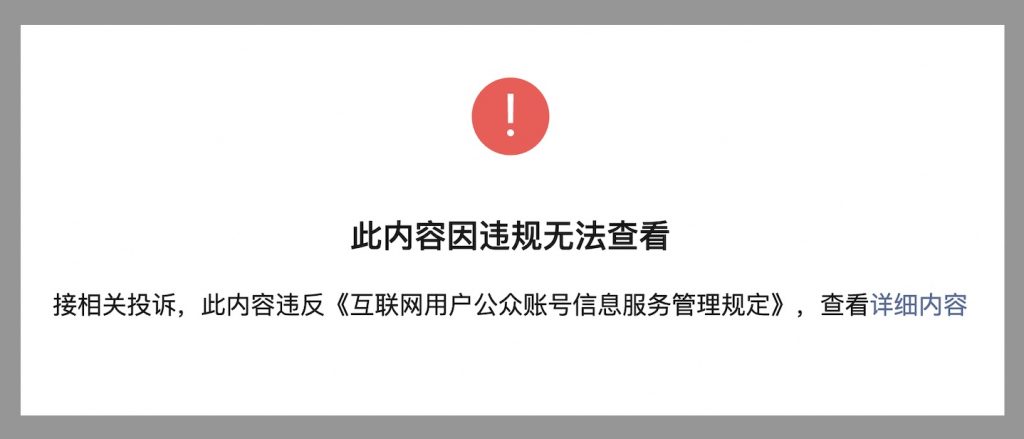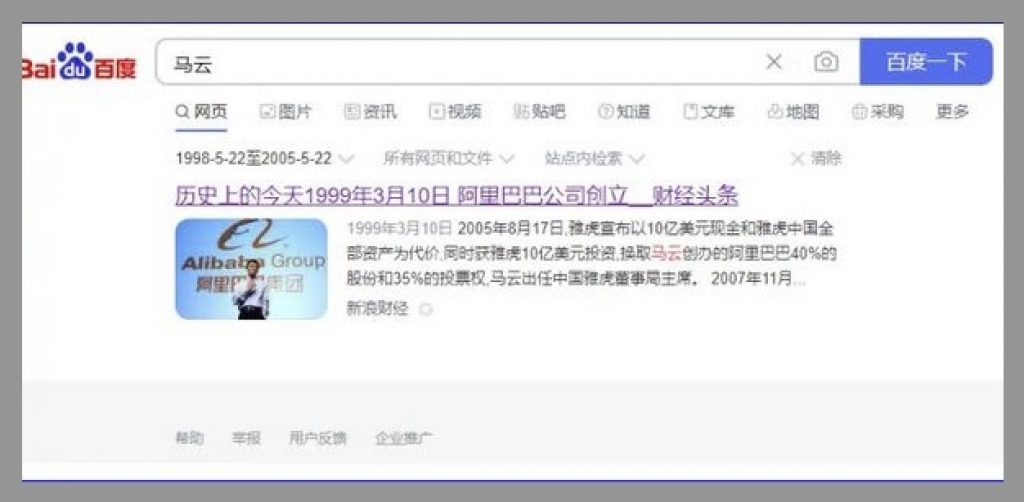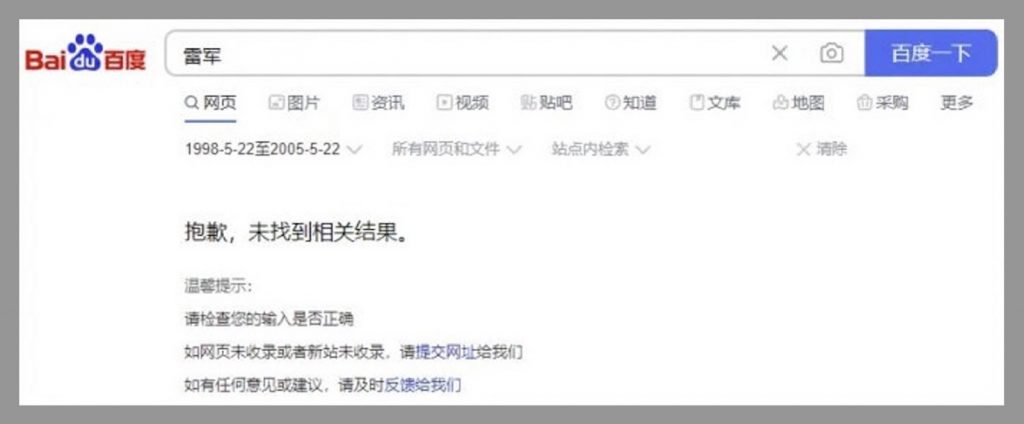
In a fitting illustration last week of the Chinese leadership’s unrelenting efforts to manipulate collective memory, an online essay with a shocking revelation about the wholesale disappearance of Chinese internet content spanning the 2000s was deleted by content monitors. But the post, quickly archived and shared, reverberated in platforms beyond PRC-managed cyberspace.
Written by He Jiayan (何加盐), an internet influencer active since 2018, the essay concluded, based on a wide range of searches of various entertainment and cultural figures from the late 1990s through the mid-2000s, that nearly 100 percent of content from major internet portals and private websites from the first decade of China’s internet has now been obliterated. “No one has recognized a serious problem,” wrote He. “The Chinese-language internet is rapidly collapsing, and Chinese-language internet content predating the emergence of the mobile internet has almost entirely disappeared.”
Simple searches through the Baidu search engine for public figures such as Alibaba founder Jack Ma and Xiaomi CEO Lei Jun (雷军), who would have yielded perhaps millions of unique posts during the period of the “traditional internet” from the late 1990s through the end of the 2000s, turned up few if any results, He Jiayan revealed. These wholesale absences in Chinese-language content from inside China were repeated when He used non-Chinese search engines, including Google and Bing.
The post cited several reasons for this mass vanishing, including the phasing out of private websites and blog platforms as technologies developed, the shuttering of old and unprofitable platforms by commercial providers who have no commercial incentive to maintain archives, and a lack of social resources in China that might handle archiving as a preservation initiative (like Internet Archive in the United States). But as others commented outside the Great Firewall, the most decisive factor in the loss of content and the failure to archive has been the Chinese Communist Party and its mandate for political and ideological control of history and public opinion.
Posted on Wednesday, May 22, He’s post had been removed from WeChat by the following day, yielding a 404 message that read: “This content violates regulations and cannot be viewed.”

Acknowledging the various reasons for the widespread outage of content from the period of China’s traditional internet, the fact of this mass vanishing raises huge questions about the role of the internet in the formation of collective identity — and what it will mean for entire landscapes of history to be simply gone. “In the internet era to come, as people look back on the first two decades of the 21st century, it will be a 20-year period absent from the historical record,” He wrote. “If you still glimpse old information right now on the Chinese internet, these are just the last rays of the setting sun.”
___________
[A partial translation of He Jiayan’s post follows]
“The Chinese Internet is Collapsing” (中文互联网正在加速崩塌)
Let me ask you a small question:
If we search for the name “Jack Ma” (马云) on Baidu, and then set our search parameters from 1998 to 2005, how many pieces of information do you suppose we’ll turn up? 100 million? 10 million? One million?
I have asked in several groups, and most feel it should be somewhere in the neighborhood of millions or tens of millions. After all, the internet is such a vast reservoir of information. Jack Ma, as the stormy entrepreneur of that era, must have left a lot of traces on the Internet.
The full search results, in fact, are as follows:

Within the selected date range of “May 22, 1998 to May 22, 2005” on Baidu, there is just one positive result for “Jack Ma” (dated May 22, 2024).
This piece of information is also false. Click on the result and you’ll find it is an article posted in 2021, which does not fall within the specified time frame but is somehow, inexplicably, returned.
This means that if we set out to understand Jack Ma’s experience over this particular time period — including news reports, public discussions, his speeches, company developments, and so on — the sum total of the material we derive from this search is zero.
You may imagine this is a problem unique to Baidu. But if you switch to Bing or Google, can you obtain search results?
I tested, these two sites to search for valid information, and both were not much different from Baidu. They had slightly more, but only in the single digits still. There were also more cases again of invalid information out of order [within the time frame], results that were wrongly pulled out of the search for some unspecified technical reason.
You might wonder if this could happen because Jack Ma is one of the more controversial people out there — that for some indescribable reason, his information is unsearchable.
But Jack Ma is in fact not an isolated case. If we search for [Tencent founder] Pony Ma (马化腾), [Xiaomi CEO] Lei Jun (雷军), [Huawei CEO] Ren Zhengfei (任正非), and so on, or even for figures like [Chinese entrepreneur and internet celebrity] Luo Yonghao (罗永浩) and Sister Fu Rong (芙蓉姐姐) who were hot topics at that time, and even if we search for internet stars like [Taiwanese singer and musician] Jay Chou (周杰伦) or [Super Girl contest winner] Li Yuchun (李宇春), we still get the same results.
When we search for information about Lei Jun for the period, here are the results we get:

After testing various websites and people’s names, over varying time periods, I discovered a shocking phenomenon:
Nearly all of the Chinese websites that were popular back in those days — the likes of NetEase (网易), Sohu (搜狐), Campus BBS (校园BBS, Xici Hutong (西祠胡同), Kaidi Maoyan (凯迪猫眼), Tianya Forum (天涯论坛), SchoolNet (校内网), Sina blogs (新浪博客), Baidu Post (百度贴吧), and a massive number of personal websites — have completely vanished before a certain date, or in most cases have disappeared altogether. The only apparent exception is Sina.com, where you can still find some information from more than ten years ago, but still very little. More than 99.9999 percent of the other content from that time has disappeared.
No one has recognized a serious problem: the Chinese-language internet is rapidly collapsing, and Chinese-language internet content predating the emergence of the mobile Internet has almost entirely disappeared.
We once believed that the internet had a memory. We failed to realize that this memory was like the memory of a goldfish.
[2]
This problem came to my attention because the subject of the He Jiayan public account is the research of leading lights in society. For this reason, I routinely need to research material about such figures.
Over the past two years, I had a very distinct feeling: the amount of original material I could find online was declining in a sharp, cliff-like manner. Some of the original reports I had seen in the past were later slowly vanishing. The speeches that my target subjects had made in the past, or the articles they had written, were also becoming impossible to find. Video interviews and discussions I had seen before were also slowly disappearing.
Perhaps there was a monster devouring webpages, and it was following the historical timeline — swallowing pages starting in the past and moving on toward the present, first in nibbles and then in great bites, chomping away the Chinese internet in five and ten-year chunks.




















